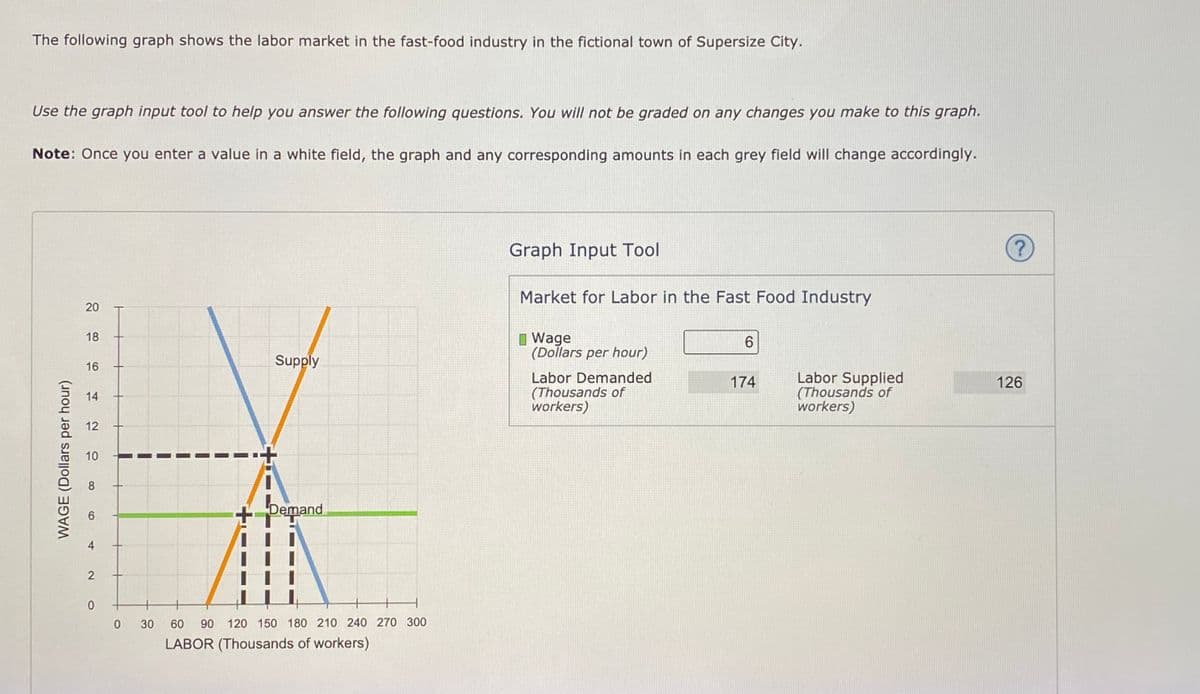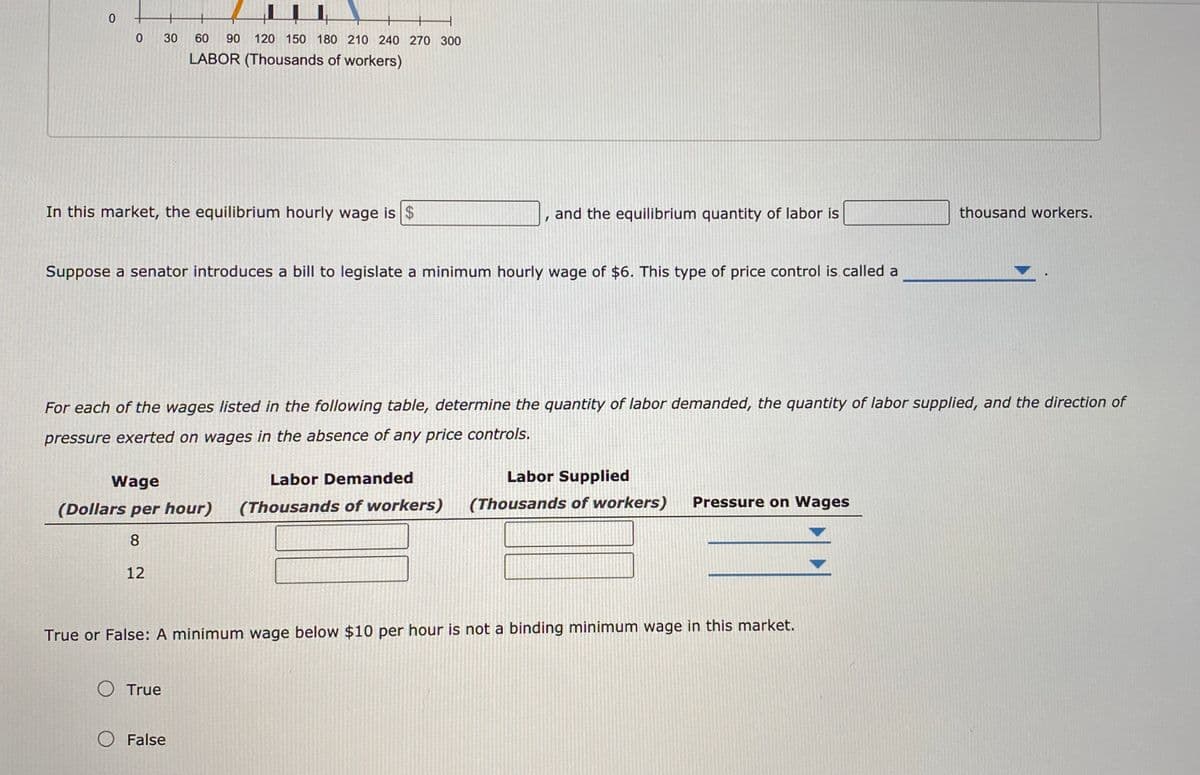In this market, the equilibrium hourly wage is $ and the equilibrium quantity of labor is thousand workers. Suppose a senator introduces a bill to legislate a minimum hourly wage of $6. This type of price control is called a For each of the wages listed in the following table, determine the quantity of labor demanded, the quantity of labor supplied, and the direction of pressure exerted on wages in the absence of any price controls. Wage Labor Demanded Labor Supplied (Dollars per hour) (Thousands of workers) (Thousands of workers) Pressure on Wages 8 12 True or False: A minimum wage below $10 per hour is not a binding minimum wage in this market. O True False
In this market, the equilibrium hourly wage is $ and the equilibrium quantity of labor is thousand workers. Suppose a senator introduces a bill to legislate a minimum hourly wage of $6. This type of price control is called a For each of the wages listed in the following table, determine the quantity of labor demanded, the quantity of labor supplied, and the direction of pressure exerted on wages in the absence of any price controls. Wage Labor Demanded Labor Supplied (Dollars per hour) (Thousands of workers) (Thousands of workers) Pressure on Wages 8 12 True or False: A minimum wage below $10 per hour is not a binding minimum wage in this market. O True False
Microeconomics: Private and Public Choice (MindTap Course List)
16th Edition
ISBN:9781305506893
Author:James D. Gwartney, Richard L. Stroup, Russell S. Sobel, David A. Macpherson
Publisher:James D. Gwartney, Richard L. Stroup, Russell S. Sobel, David A. Macpherson
Chapter12: The Supply Of And Demand For Productive Resources
Section: Chapter Questions
Problem 12CQ
Related questions
Question

Transcribed Image Text:The following graph shows the labor market in the fast-food industry in the fictional town of Supersize City.
Use the graph input tool to help you answer the following questions. You will not be graded on any changes you make to this graph.
Note: Once you enter a value in a white field, the graph and any corresponding amounts in each grey field will change accordingly.
Graph Input Tool
Market for Labor in the Fast Food Industry
20
I Wage
(Dollars per hour)
18
Supply
16
Labor Demanded
(Thousands of
workers)
Labor Supplied
(Thousands of
workers)
174
126
14
12
10
8
Demand
4
2
30
60
90 120 150 180 210 240 270 300
LABOR (Thousands of workers)
WAGE (Dollars per hour)

Transcribed Image Text:30
60
90
120 150 180 210 240 270 300
LABOR (Thousands of workers)
In this market, the equilibrium hourly wage is $
and the equilibrium quantity of labor is
thousand workers.
Suppose a senator introduces a bill to legislate a minimum hourly wage of $6. This type of price control is called a
For each of the wages listed in the following table, determine the quantity of labor demanded, the quantity of labor supplied, and the direction of
pressure exerted on wages in the absence of any price controls.
Wage
Labor Demanded
Labor Supplied
(Dollars per hour)
(Thousands of workers)
(Thousands of workers)
Pressure on Wages
8.
12
True or False: A minimum wage below $10 per hour is not a binding minimum wage in this market.
O True
O False
Expert Solution
This question has been solved!
Explore an expertly crafted, step-by-step solution for a thorough understanding of key concepts.
This is a popular solution!
Trending now
This is a popular solution!
Step by step
Solved in 2 steps

Knowledge Booster
Learn more about
Need a deep-dive on the concept behind this application? Look no further. Learn more about this topic, economics and related others by exploring similar questions and additional content below.Recommended textbooks for you

Microeconomics: Private and Public Choice (MindTa…
Economics
ISBN:
9781305506893
Author:
James D. Gwartney, Richard L. Stroup, Russell S. Sobel, David A. Macpherson
Publisher:
Cengage Learning

Economics: Private and Public Choice (MindTap Cou…
Economics
ISBN:
9781305506725
Author:
James D. Gwartney, Richard L. Stroup, Russell S. Sobel, David A. Macpherson
Publisher:
Cengage Learning


Microeconomics: Private and Public Choice (MindTa…
Economics
ISBN:
9781305506893
Author:
James D. Gwartney, Richard L. Stroup, Russell S. Sobel, David A. Macpherson
Publisher:
Cengage Learning

Economics: Private and Public Choice (MindTap Cou…
Economics
ISBN:
9781305506725
Author:
James D. Gwartney, Richard L. Stroup, Russell S. Sobel, David A. Macpherson
Publisher:
Cengage Learning




Economics (MindTap Course List)
Economics
ISBN:
9781337617383
Author:
Roger A. Arnold
Publisher:
Cengage Learning